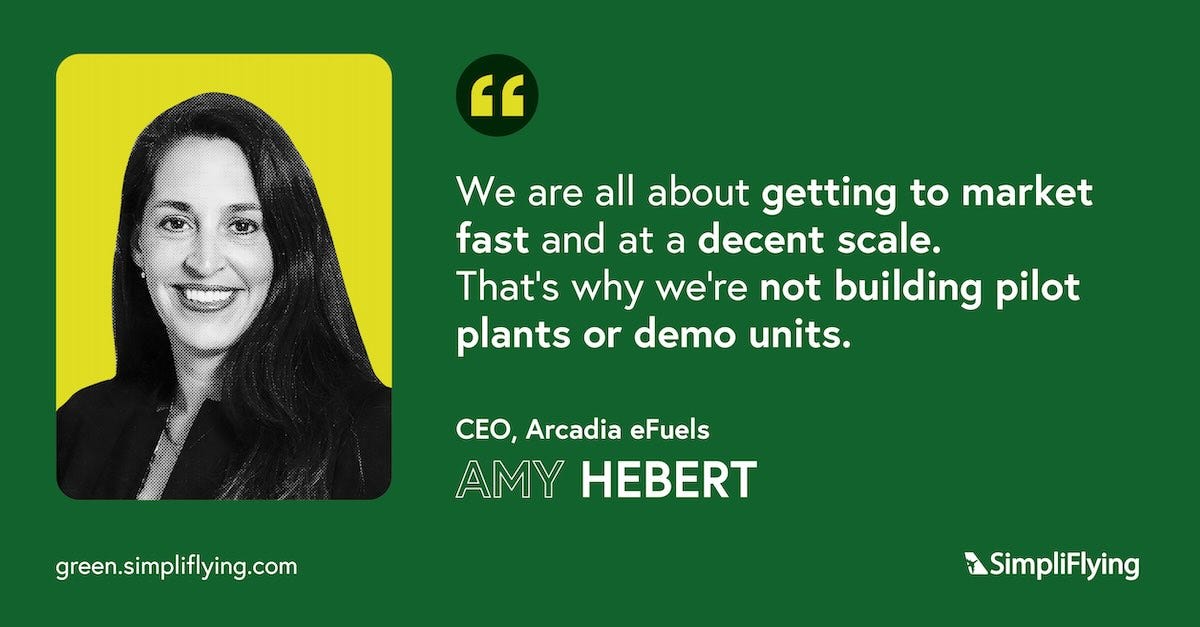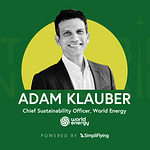In this episode of our ‘Sustainability in the Air’ podcast, Amy Hebert, Chair of the Board and CEO at Arcadia eFuels, speaks with SimpliFlying CEO Shashank Nigam about the rapidly growing field of sustainable aviation fuel (SAF), with a focus on eFuels, which are a sustainable alternative not just to fossil fuels but may also be more viable than feedstock intensive biofuels.
Hebert mentions how her entry into the SAF sector was due to her surprise at the lack of significant production of carbon-neutral fuels despite existing technology. She was motivated by the need to reduce carbon emissions in hard-to-decarbonise sectors like aviation and long-haul trucking.
She explains that while technologies for producing carbon-neutral fuels were known, they weren’t used to produce essential fuels like diesel and kerosene. Instead, the industry focused on products like e-methanol and e-ammonia, leaving a market gap for diesel and kerosene eFuels, which her company now aims to address.
Here are the key highlights of the conversation:
Simplifying the concept of eFuels (2:25)
Differentiating Arcadia’s eFuels (4:25)
Market dynamics and challenges (5:24)
Dealing with the resource intensity of eFuels (10:20)
Importance of offtake agreements (14:45)
Sourcing green hydrogen for eFuels (17:43)
The role of book and claim (20:56)
Expansion plans (21:44)
Keep reading for a quick overview of the episode.
Why Arcadia’s approach to eFuels matters
Hebert explains that eFuels are composed of hydrogen and carbon atoms arranged to form various fuels like diesel, kerosene, or gasoline. This process involves using renewable electricity and water electrolysis to separate hydrogen and oxygen, then combining the hydrogen with captured CO2.
Arcadia focuses on efficiently producing these eFuels at scale without pilot plants, as the technology is already established. Their approach includes scaling up electrolysers and syngas reactions, leading to a fully electrified plant that doesn’t rely on fossil inputs. They aim to produce 100 million litres of eFuels annually, reducing CO2 emissions by about 250,000 tonnes.
“The problem of the world is there’s too much CO2 in the atmosphere. So there’s people that are capturing the CO2 emissions, either from a biogenic source, of course, direct air capture, and also, of course, a fossil source. So we can buy that CO2 that people have captured, then we have our carbon source, and we have our hydrogen source.”
5 critical aspects of commercialising eFuels
1. The importance of offtake agreements
The development of SAF marks a critical shift in the aviation industry’s approach to reducing its carbon emissions.
Hebert highlights that while SAF production is in its nascent stages, the key to kickstarting this initiative lies in securing offtake agreements. These agreements are essential for acquiring the necessary funding and ensuring a stable market for the product once production begins, which is anticipated around late 2026 to early 2027.
Hebert also stresses the complexity of these offtake agreements, as they require long-term commitments, a significant change from traditional fuel purchasing practices in the aviation industry.
2. Resource intensity
Addressing the concern about the resource intensity of eFuels, Hebert offers an optimistic perspective, comparing the evolution of eFuels to the historical advancements in computers and solar technology.
Similarly, she anticipates that eFuels will become more efficient and less resource-intensive over time. Hebert points to ongoing improvements in renewable energy generation and advancements in electrolyser technology as key factors that will enhance the viability and sustainability of eFuels.
“Let’s take the solar panel developed back in the early 2000s. It was clunky, heavy, not very efficient. And now they are much more efficient. I really feel that eFuels will see similar improvements over time.”
3. Challenges in cost and infrastructure for SAF production
Hebert acknowledges the significant challenges in cost and infrastructure associated with SAF production.
She notes that existing large-scale refineries are not equipped to handle the small-scale processing required for eFuels, necessitating new infrastructure development. This challenge is coupled with the high cost of setting up SAF production facilities.
However, Hebert expresses confidence that as the industry gains more experience and the technology involved matures, costs will gradually decrease. This decrease is expected to follow the trend observed in other technology sectors, where initial high costs eventually gave way to more affordable and efficient solutions.
“The existing refineries today are very large scale. They can’t process a very small amount of either Fischer-Tropsch crude or even green hydrogen. We need to start with smaller scale projects like ours.”
4. Sourcing green hydrogen for eFuels
Green hydrogen – produced with electricity from renewable sources – is a crucial component for eFuels, and sourcing it presents its own set of challenges.
Hebert mentions that her company has had to take the initiative to build its green hydrogen infrastructure, as existing projects were not meeting their scale requirements. This involved significant investment in electrolysers to produce green hydrogen at the required scale.
Hebert’s approach illustrates the proactive measures companies must take to ensure a steady supply of essential raw materials, amidst a backdrop where the demand for green hydrogen is increasing, but supply-side initiatives are still catching up.
“We’ve had to build our green hydrogen ourselves... we just ordered a 280 megawatt electrolyser from Plug Power to make these eFuels.”
5. The role of book and claim and corporate involvement
Engaging with potential customers and securing financing for SAF production is a complex endeavour.
Hebert discusses the challenge of convincing airlines and fuel distributors to commit to long-term offtake agreements, which are crucial for the financial stability of SAF projects.
She also sees potential in the book and claim system, which could play a significant role in SAF distribution, especially for corporations aiming to reduce their emissions.
“It’s really tricky. Everybody wants to buy these fuels, but we need to raise money from debt and equity investors, which typically require 12-year take-or-pay off-take agreements.”
‘Sustainability in the Air’ is the world’s leading podcast dedicated to sustainable aviation. Through in-depth conversations with top aviation leaders, we break through the clutter and provide a clear roadmap for a net-zero future.














